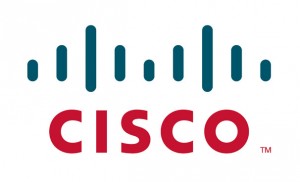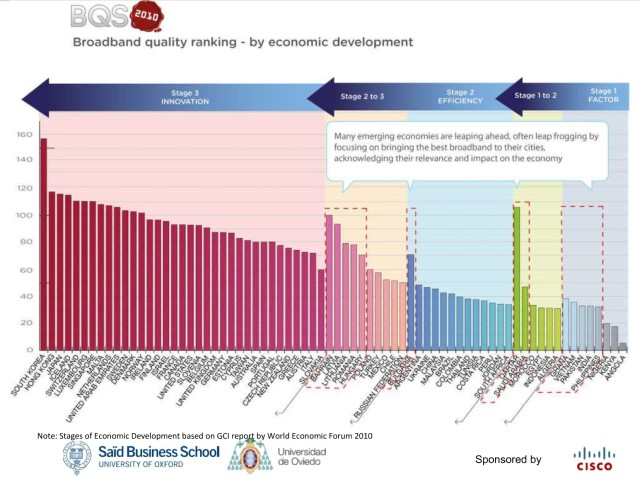 Cisco has released the results of the third annual study from the Saïd Business School at Oxford University, which looks at broadband quality in 72 countries and 239 cities around the world. The results are an embarrassment to much of North America’s broadband.
Cisco has released the results of the third annual study from the Saïd Business School at Oxford University, which looks at broadband quality in 72 countries and 239 cities around the world. The results are an embarrassment to much of North America’s broadband.
Using data from 40 million real-life broadband quality tests conducted in May-June of 2010 on the Internet speed testing site, Speedtest.net, the researchers were able to generally evaluate broadband conditions in the 72 countries which generated enough tests to provide useful results.
Although these kinds of studies often end up indirectly promoting Cisco’s own products (which they’d argue go hand-in-hand with broadband improvement), the findings highlight the very real problem that most aggressive broadband development is taking place outside of North America. Here at home, reduced investment and foot-dragging has kept growth in check, even as prices continue to rise.
Based on the findings, the countries with the most sophisticated and advanced broadband networks are:
| Broadband leadership table (top 10):Ranking | Broadband Leadership 2010 |
| 1 | South Korea |
| 2 | Hong Kong |
| 3 | Japan |
| 4 | Iceland |
| 5 | Switzerland. Luxembourg, Singapore (tie) |
| 6 | Malta |
| 7 | Netherlands |
| 8 | United Arab Emirates, Qatar (tie) |
| 9 | Sweden |
| 10 | Denmark |
While the United States and Canada both languish in 15th place, broadband in South Korea has gone from excellent to outstanding as it continues aggressive, almost revolutionary improvements in service and speed:
- South Korea tops the broadband leadership ranking for the second year in a row;
- Broadband quality in South Korea is ranked the highest and has set a new benchmark for the world;
- Average download throughput is 33.5 Mbps, an increase of 55% from 2009, average upload throughput is 17 Mbps, an increase of 430%, and average latency is 47ms, an improvement of 35% vs. 2009 figure;
- South Korea has achieved 100% broadband penetration.
Cisco’s study found North America is in peril of falling even further behind because providers are trying to incrementally upgrade inferior, obsolete copper-wire phone networks on the cheap instead of replacing them.
As long as providers in the United States and Canada maintain a Dollar Store-mentality towards broadband improvement, both countries will increasingly fall further and further behind countries many Americans couldn’t find on a map.
Developing economies, especially in eastern Europe, are poised to leapfrog over North America and potentially become new powerhouses in the digital global economy of the future. Among the nations on the verge of blowing past the United States and Canada: Lithuania, Latvia, Bulgaria, Romania, the Czech Republic and Hungary.
Welcome to the 500GB Broadband Economy
Cisco’s study also includes some important findings about data consumption that expose North American broadband providers who support Internet Overcharging schemes as direct threats to our economic future in a knowledge economy:
The study assessed the average consumption of different household segments and found major differences between basic-digital homes and smart and connected homes:
- Basic digital homes which mainly use the web for simple-quality requirement applications such as web browsing, instant messaging and social networking, consume about 20 GB per month;
- Smart and connected households, who would use the web for high definition video communication, high definition entertainment, tele-education or telemedicine, home security and others, can easily consume 500 GB per month and require an assured bandwidth of 18 Mbps.
Under these terms, Canada’s digital economy is already destined to fail because virtually every provider in the country limits broadband consumption to levels far below that required by “smart and connected households.” In the United States, some providers have suggested as little as 5GB would represent “enough usage” under residential broadband accounts. The nation’s largest cable company, Comcast, limits consumption to half the amount required. Those advocating unlimited broadband or far higher limits are accused of being “bandwidth hogs” or pirates by many of these providers and their dollar-a-holler friends.
World leaders in broadband have some things in common: availability of inexpensive, unlimited broadband delivering fiber-fast speeds. Those falling behind or at the bottom are raising broadband prices, putting limits on consumption and delivering slow broadband speeds that would draw laughter in countries as diverse as Japan, Sweden, and the United Arab Emirates.


 Subscribe
Subscribe



love what you guys do. 🙂
Well nice to know that the USA is relegating itself into obscurity.
World leaders in Broadband have one thing in common that you missed, they are small in area or have most of their population living in one city! 60% of the population of Iceland live in Reykjavik.
You can make stats say anything!